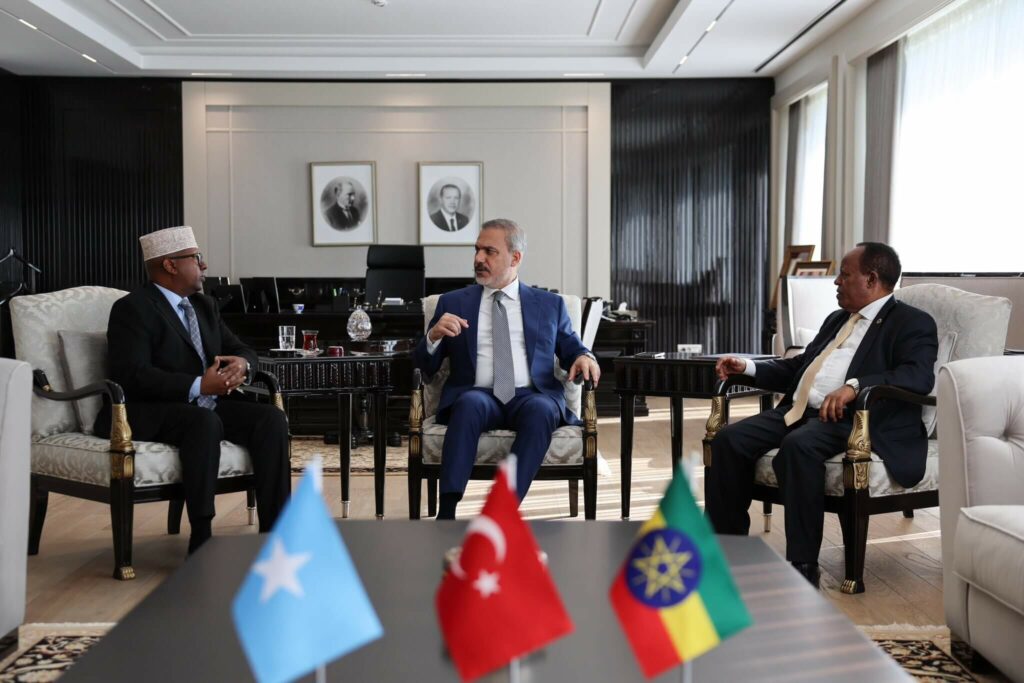Fatih Yurtsever*
After months of regional tension, Turkey has successfully brokered a landmark agreement between Ethiopia and Somalia, potentially resolving a longstanding maritime access dispute that threatened to destabilize the Horn of Africa.
The Ankara Declaration, signed by Ethiopian Prime Minister Abiy Ahmed and Somali President Hassan Sheikh Mohamud under the mediation of Turkish President Recep Tayyip Erdoğan, represents a major diplomatic breakthrough following two failed rounds of talks since July.
The crisis emerged in January 2024 when Ethiopia struck a controversial deal with Somaliland, offering recognition of the breakaway region’s independence in exchange for port access and a potential military base. Somalia, which considers Somaliland part of its territory, responded by expelling Ethiopia’s ambassador and blocking its participation in regional peacekeeping operations.
Under the new agreement, three main points stand out. The declaration reaffirms Somalia’s territorial integrity, explicitly denying the validity of Ethiopia’s earlier arrangement with Somaliland. Ethiopia is granted “reliable and sustainable” sea access via Somali ports, though this access is subject to Somali authority and oversight.
Both nations agree to begin technical negotiations by February 2025, with a strict four-month deadline to finalize the details of this commercial arrangement.
US diplomatic intervention was key to pushing both sides toward compromise, reflecting Washington’s strategic interests in the Horn of Africa. American officials were particularly concerned that the crisis might force Ethiopia to withdraw from peacekeeping operations against al-Shabab militants in Somalia.
“The U.S. expressed concerns about security and peacekeeping operations in Somalia,” said Tom Gardner, The Economist’s Africa correspondent. Ethiopian troops are crucial to regional counterterrorism efforts, and any reduction in their presence could have significantly undermined security gains against al-Shabab.
The Ankara Declaration addresses these concerns by maintaining Ethiopia’s troop commitments in Somalia while creating a framework to resolve the maritime access dispute. This balance between military stability and diplomatic settlement was a primary objective for both Ankara and Washington.
Despite the promising outcome, skepticism lingers. Only hours after the signing, Ethiopia’s state news agency posted — and then deleted — a tweet asserting Addis Ababa’s continued rights to sea access through the still-controversial Somaliland deal. The incident has raised questions about Ethiopia’s genuine commitment to the declaration.
According to Omar Mahmood, a senior analyst at Crisis Group, the agreement opens new economic and strategic opportunities in the Horn of Africa. “This deal provides Abiy Ahmed with access to the sea, while connecting Ethiopian markets to the Somali coast makes economic sense,” he noted.
However, the success of the agreement hinges on the upcoming technical negotiations and how well both parties adhere to the agreed terms. Somaliland’s response also remains a wildcard, as the breakaway region’s new president, Abdirahman Mohamed Abdullahi, reportedly shows less enthusiasm for accommodating Ethiopia than his predecessor did.
With technical negotiations set to start in early 2025 and a four-month window for finalization, both Ethiopia and Somalia face tight deadlines. Somalia, in particular, must balance Ethiopia’s logistical needs with its own sovereignty concerns and broader political stability.
The declaration’s carefully worded provisions point to an uneasy compromise rather than a complete reset in relations — a reminder of the fragile equilibrium shaping regional stability in the Horn of Africa.
* Fatih Yurtsever is a former naval officer in the Turkish Armed Forces. He uses a pseudonym due to security concerns.

